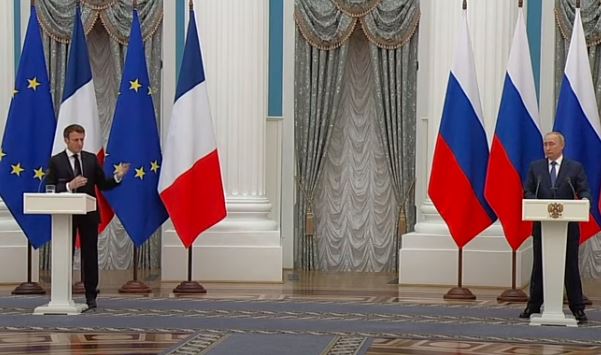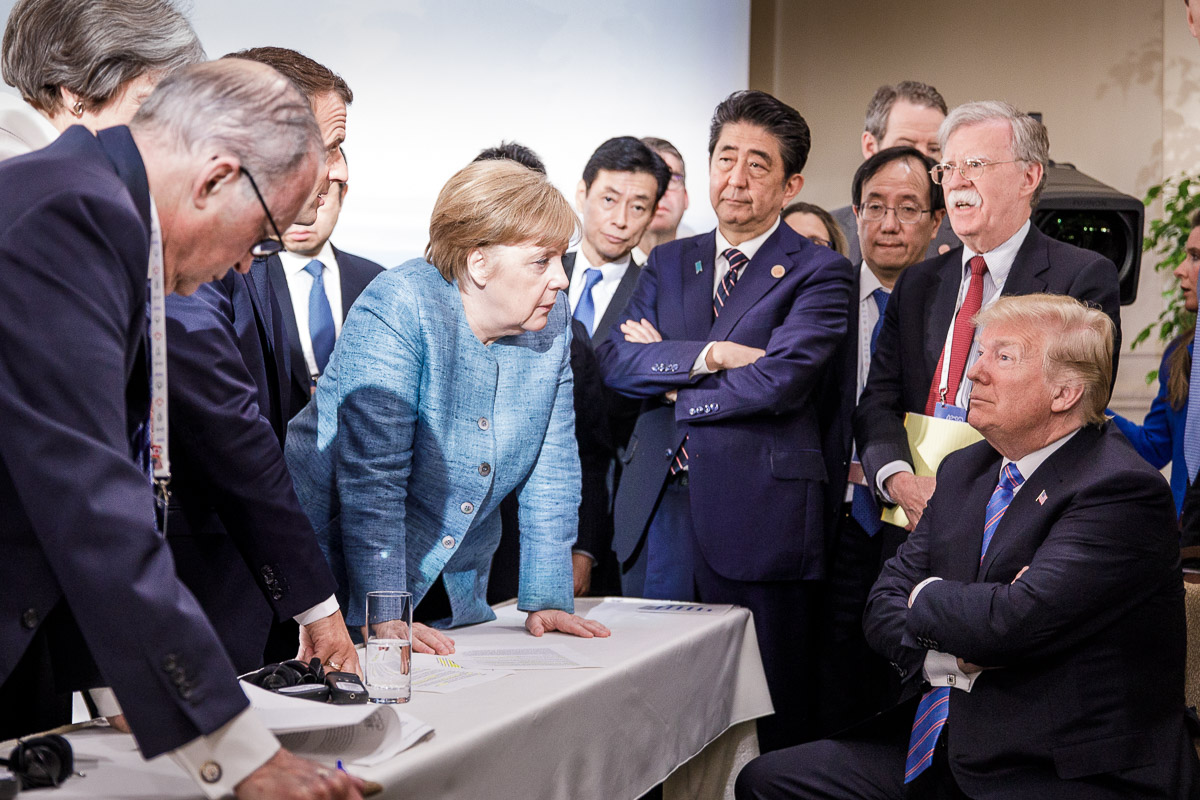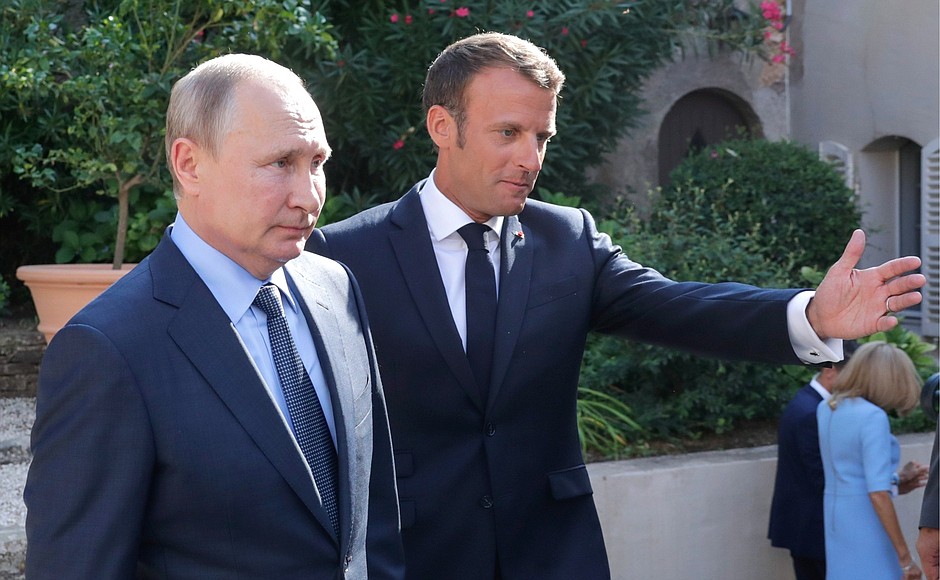On Tuesday night, 8 February, speaking after meeting with Russian President Putin in Moscow, French President Emmanuel Macron confirmed that Ukrainian President Volodymyr Zelenskyy withdrew a crucial bill that affirmed Ukraine’s “red lines” in the implementation of the Minsk peace deal between Ukraine and Russia. Official Kyiv had denied that the withdrawal, which essentially meant succumbing to Russian demands, was done in order to resume the meetings in the Normandy Format after a two-year pause.
Even though the French President did not specify that it was the bill “On Principles of State Policy of the Transition Period” (Transition Period bill) that was recalled, this is the only draft law withdrawn recently. Mr. Macron congratulated the move which he claimed was in conflict with the Minsk protocols [tooltip - ].
It is likely that the urgent withdrawal, which was followed by a meeting viewed by experts as a “win for Russia,” was one of the successful outcomes of Russia’s saber-rattling along the Ukrainian border and subsequent demands for NATO restrictions.
Normandy talks for Ukraine-Russia conflict resolution resumed. Why was it a win for Russia?
Why did Zelensky recall the Transition Period bill?
The government urgently revoked the draft bill #5844, which outlines the reintegration of occupied territories currently under the control of the Russian proxy Donetsk and Luhansk “People’s Republics” on 24 January, two days before the Normandy Talks of representatives of Ukraine, Russia, Germany, and France in Paris.
According to political analyst Maria Zolkina, this bill sets clear lines for the questions that Russia had pressured Ukraine with during Minsk negotiations, specifically, on resuming state control on the now-occupied territories in the case of their reintegration, the automatic disbandment of all occupation authorities and their replacement by temporary transitional administration, preparation for elections, disarmament, etc.
“That is, the mechanism of the bill rules out any possibility of dialogue with the Russian-backed ‘separatists’ and the coexistence of self-proclaimed and Ukrainian institutions,” Zolkina wrote, arguing that the Normandy talks that took place on 26 January were already a victory for Russia,
“because Kyiv not only complied with Russia’s demand but also proved that it was ready to change the legislative process under Russian influence, despite the fact that there was no chance to get any concessions from Russia.”
Everything you wanted to know about the Minsk peace deal, but were afraid to ask
As the Transition Period bill envisions that the current Russian-backed administrations of Donbas are to be disbanded, it had drawn the ire of Russia’s Foreign Minister Lavrov, who on 13 November 2021 claimed that Ukraine would “announce its departure from the Minsk agreements” if it adopts the bill. Furthermore, Lavrov said that France and Germany assured Moscow that they will do “everything possible” for the bill to not be passed.
Official Kyiv claimed the bill was withdrawn to implement the Venice Commission’s recommendations. Ukraine’s deputy minister of Reintegration of temporarily occupied territories Iryna Vereshchuk announced that her ministry plans to improve the bill together with international and Ukrainian experts.
There are two moments casting doubt on the official version. Initially, the withdrawal of the bill was the only matter for which Ukraine’s government, the Cabinet of Ministers, gathered for an irregular meeting. Secondly, the Venice Commission gave this recommendation for Ukraine in October 2021. It is unknown why considering it was so urgent task.
Andrii Yermak, Head of the President’s Office stated that the reason for the bill being recalled was not related to the meeting in Paris and called claims to the contrary a “fake.”
On the other hand, though, Davyd Arakhamia, a member of Zelensky’s “Servant of the People” party with the majority in the Parliament, publicly confirmed that the Cabinet of Ministers revoked the draft law because it is “not quite compatible with the Normandy Format.
Mariia Zolkina, an analyst at Ukrainian independent think tank Ilko Kucheriv Democratic Initiatives Foundation (DIF), called Yermak’s statement a “manipulation” and a “lie.” “Russia indeed put forward this demand – to recall or turn down the bill in the Parliament which, despite all its setbacks, would strategically strengthen Ukraine’s positions in the negotiations.”
What the Transition Period bill states
The Ukrainian government drafted the bill “On Principles of State Policy of the Transition Period” #5844 in August 2021.
As for the essence of the bill, or rather action plan, it is a framework document that defines the state de-occupation policy for Crimea and occupied parts of Luhansk and Donetsk Oblasts.
All aspects of the transition period were supposed to be worked out in separate bills of the Ministry of Reintegration.
According to Ukraine’s Defense Minister Oleksii Reznikov, the framework bill contains standard criteria of the OSCE. He says, in contrast to Mr. Macron, that the law is the continuation of the 2014 Minsk agreement for the Russia-Ukraine conflict resolution. In the opinion of Mr. Reznikov, the return of the occupied areas must be a process safe for Ukraine’s sovereignty, integrity, and sustainable development. And that is, he claims, the key goal of the bill.
The Venice Commission’s criticism of the bill was centered around the bill lacking specifics, which makes forecasting its direct impact impossible. The bill was also criticized by Ukrainian legal experts, who suggested it the document is too raw and needs clarification. However, most experts greeted the key precepts of the draft legislation, which for the first time outlined the principles of transitional justice in Ukraine.
The key provisions of the Transition Period bill include:
- Russia started the occupation of Ukraine on 20 February 2014;
- Russia is an aggressor and occupier that violated the international law when invaded Ukraine;
- Russian occupation of Ukraine is illegal;
- Ukrainian laws apply to temporarily occupied areas of Ukraine;
- State bodies do not act on the occupied territories apart from special functions, such as counter-terrorism and humanitarian;
- Activities of Russian occupation authorities in Ukraine are illegal;
- Legal acts of occupation regime and Russia with regard to seized areas are null and void;
- Ukraine does not recognize Russian nationality (obtained forcibly or automatically) of Ukrainian citizens living in occupied territories;
- Official Kyiv’s relations with occupation authorities may take place only to ensure Ukraine’s national interests for human rights protection;
- Individuals from the occupation authorities (judges, prosecutors, deputies of the local legislative authorities, village/city heads, servicemen) who had committed serious crimes may not be amnestied;
- State and local elections and referenda may not be held in occupied territories;
- Persons who had contributed with their acts or inaction to “undermining the foundations of national security and defense of Ukraine or violated human rights and freedoms” are barred from participating in elections (i.e. all persons who hold official positions in the occupation administrations);
- Local and state elections and referenda in Crimea and Donbas can only be held after de-occupation and without any Russian interference.
Is the bill really in conflict with the Minsk protocols?
Taking into account that Ukraine was forced to sign the second Minsk protocol, which is now universally referred to as the “Minsk Agreements,” under the dual pressure of Russia’s military escalation and German and French leaders, it must first be stressed that the document contains a contradictory statement that has become the bone of contention between Ukraine and Russia in Normandy talks following the adoption of the second package of Minsk documents.
Namely, it is impossible to reconcile two requirements for the “special status” of [“certain areas of Donetsk and Luhansk oblasts.” i.e. currently-occupied Donbas']ORDLO[/simple_tooltip] as outlined in the second package of Minsk:
- That Ukraine regains control of its border after snap elections are conducted there and a reform of the Ukrainian Constitution is carried out;
- That said snap elections are held in compliance with OSCE standards.
After 2015, Russia has consistently pushed for Ukraine to implement this “political” package of Minsk while Ukraine has been steadfast in demanding that the de-occupation of ORDLO takes place before any discussions about elections take place.
The requirements for elections in the draft Transition Period bill withdrawn on Russia’s demand, therefore, do contravene the Russian interpretation of the Minsk protocols. However, the protocols themselves are contradictory to the point of impossibility of implementation.
A second crucial issue on which Russia is clashing with Ukraine is the requirement for amnesty. The second Minsk protocol sets broad requirements for amnesty and prohibition of discrimination of “persons related to events occurring in the ORDLO” through a separate law. This “separate law” was adopted on 16 September 2014 but was never signed by the president. It envisioned an amnesty for those who voluntarily laid down their weapons, except those who committed serious crimes (premeditated murder, sabotage, attempt on the life of a statesman or public figure, infliction of grievous bodily harm, hostage-taking with grave consequences, trafficking in human beings and rape, robbery, smuggling, committing a terrorist act, insulting the body of the deceased, war crimes, genocide and assault on the life of a representative of a foreign state or international organization) or were involved in the crash of the MH17 airliner.
The bill just withdrawn at Russia’s behest clashes with this never-signed 2014 Amnesty bill in two ways:
- The Transition Period bill states that only officials of the occupation administrations who had committed grave crimes cannot be amnestied, while the 2014 Amnesty bill stated that all individuals who had committed grave crimes cannot be amnestied. Therefore, the most recent bill is actually more lenient towards ORDLO participants of the conflict (this provision has met criticism in Ukraine);
- However, the Transition Period bill requires lustration for said officials, who are barred from taking part in elections. The 2014 Amnesty bill had no such limitations; moreover, Ukraine’s law on the special status of Donbas adopted in 2014 (and extended each year, including to 2022) precludes the “discrimination” of participants “events in Donetsk, Luhansk oblasts.”
As Russia’s aim is to inject its puppet “leaders” of the regions into Ukraine’s political organism, it is easy to see why it has consistently insisted on full amnesty for those involved in its puppet statelets.
Ukrainian public opinion rejects Russian demands for Minsk protocols
The Transition Period bill thus contravenes Russia’s plans to legalize its puppets in Ukraine’s political life, as well as the already-adopted Law on the special status of Donbas.
However, it largely reflects Ukrainian attitudes towards the settlement of the conflict. A 2019 poll by the Democratic Initiatives Foundation found that:
- 66% of Ukrainians reject holding elections in Donbas under conditions of the Russian-backed militants (16% were in support).
Regarding amnesty, both the Transition Period bill and Amnesty bills are at odds with Ukrainian public opinion:
- Only 22% of Ukrainians believed that all ORDLO participants of armed aggression sans those who committed grave crimes could be amnestied; 23% stated that only civilians who participated in the occupation administrations could be amnestied; 25% rejected any kind of amnesty.
Related:
- Normandy talks for Ukraine-Russia conflict resolution resumed. Why was it a win for Russia?
- Leaked Kremlin emails show Minsk protocol designed as path to Ukraine’s capitulation – Euromaidan Press report
- Minsk-2 is the real problem for Ukraine, not “Steinmeier’s formula” | Infographics
- Minsk protocol and “Steinmeier’s formula” – conflict resolution or conflict conclusion?
- Experts urge to scrap term “Minsk Agreements” as they are not a treaty, use “Protocols” instead
- Zelenskyy’s first Normandy and the illusion of progress
- How Ukraine can escape the trap of the Minsk Protocols and return to international law
- Everything you wanted to know about the Minsk peace deal, but were afraid to ask





